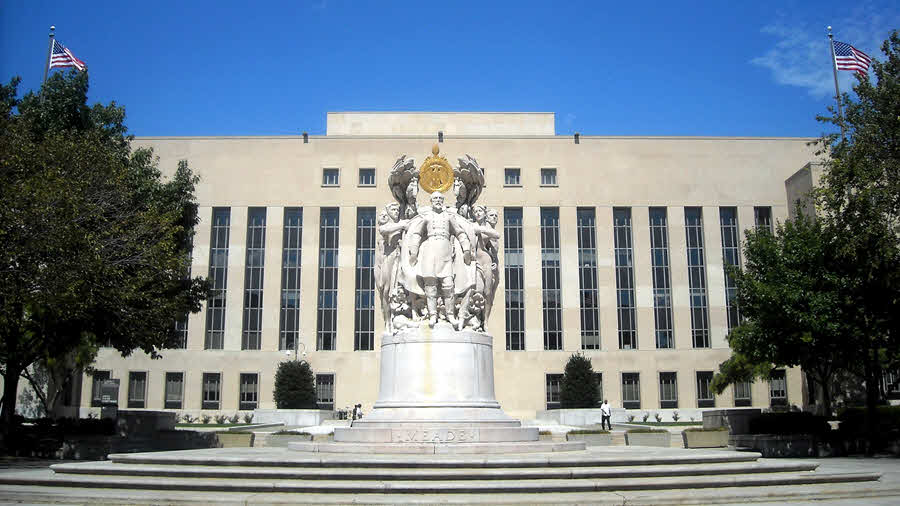FCC Defends UHF Discount Decision in Court

The smarter way to stay on top of broadcasting and cable industry. Sign up below
You are now subscribed
Your newsletter sign-up was successful
The FCC has told a federal court that it was reasonable to reinstate the UHF discount immediately while it considers adjusting the national audience reach cap, that it has the authority to adjust that cap, and that the discount and the cap have to be considered together because the UHF discount is meaningless except in relation to the cap.
That came in an opening brief filed in the U.S. Court of Appeals for the D.C. Circuit in the challenge to its UHF decision filed by Free Press, Office of Communication of the United Church of Christ (UCC), Prometheus Radio Project, Media Mobilizing Project, Media Alliance, National Hispanic, Media Coalition, and Common Cause.
The FCC under new chairman Ajit Pai voted back in April to reverse the previous Democratic majority's decision to eliminate the discount. That discount meant TV station group owners only had to count half of the audience to their UHF stations towards the 39% national audience reach cap. It dated from the days of analog T,V when UHFs were weaker than VHFs, and its restoration paved the way SInclair to try and buy the Tribune stations.
Pai has long opposed repealing the discount without also considering adjusting the audience reach cap in the same proceeding. The FCC reinstated it in response to a petition to do so by Ion Media, a major UHF station group.
"The FCC’s decision to restore temporarily a settled framework that had previously been in place for three decades rests well within its discretion under the Administrative Procedure Act, other Congressional enactments, and its own rules," the FCC told the court in asking it to reject the various groups' challenges.
The FCC argues the cap and discount are inextricably linked, so must be reconsidered together given the potential impact of eliminating the discount without raising the cap to mitigate the impact, and given the increased competition in the marketplace that could justify raising the cap. "[T]he percentage ceiling and the UHF discount reflected a collective policy judgment on the extent to which a single broadcaster could permeate the national market consistent with the public interest," it said.
The FCC says the previous decision to eliminate the discount without also considering the cap is where the FCC got it wrong, not that the discount should necessarily be maintained.
Related: Cities, Counties Seek More Broadband Input at FCC
The smarter way to stay on top of broadcasting and cable industry. Sign up below
The Pai commission brands the decision under predecessor Tom Wheeler to eliminate the discount as a "piecemeal, patchwork regulatory approach that married elimination of the UHF discount with selective exemptions for certain broadcasters." Those exemptions would be all the grandfathered groups that would otherwise have immediately been in violation of ownership rules, the one part of the UHF discount's elimination broadcasters strongly favored.
The FCC told the court that eliminating the discount amounted to a stricter cap without any showing that that furthered the public interest, which it says made that decision arbitrary and capricious, which violates the Administrative Procedures Act requirement that an agency justify its regulations.
So, says the current FCC, "Rather than assume that the public interest is best served by the existing cap, no UHF discount, and grandfathered exemptions, the Commission has now decided to solicit a robust public record on, and consider the need for, the present cap and the discount as a whole in light of current marketplace realities."
The FCC says the challengers to the decision don't even have standing to bring the suit because they have not shown they have suffered any particular injury from the decision.
The FCC also says its opponents were procedurally barred from raising the issue of FCC authority, since they took the opposite view earlier in the proceedngs. And even if they were not procedurally barred, said the commission, Congress never foreclosed the FCC from reconsidering the rule, which Congress could have done in statute. In additon, Congress has twice directed the FCC to reconsider the rule, which signaled the FCC was free to do so on its own initiative, the commission told the court. Republican Commissioner Michael O'Rielly, who voted to reinstate the discount, does not think the FCC had the authority to change the discount, including eliminating it.
As to restoring it immediately rather than waiting for the dual consideration of the cap and discount, the FCC pointed out that it had been in place for three decades (that includes most of a decade sense the DTV switch made UHF's the favored stations).
Contributing editor John Eggerton has been an editor and/or writer on media regulation, legislation and policy for over four decades, including covering the FCC, FTC, Congress, the major media trade associations, and the federal courts. In addition to Multichannel News and Broadcasting + Cable, his work has appeared in Radio World, TV Technology, TV Fax, This Week in Consumer Electronics, Variety and the Encyclopedia Britannica.

